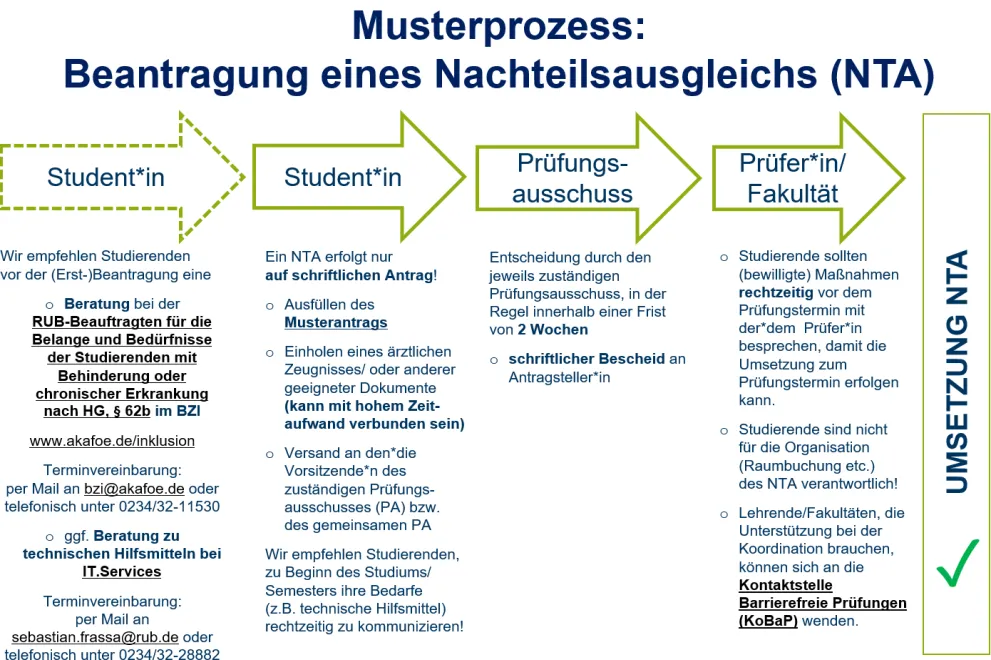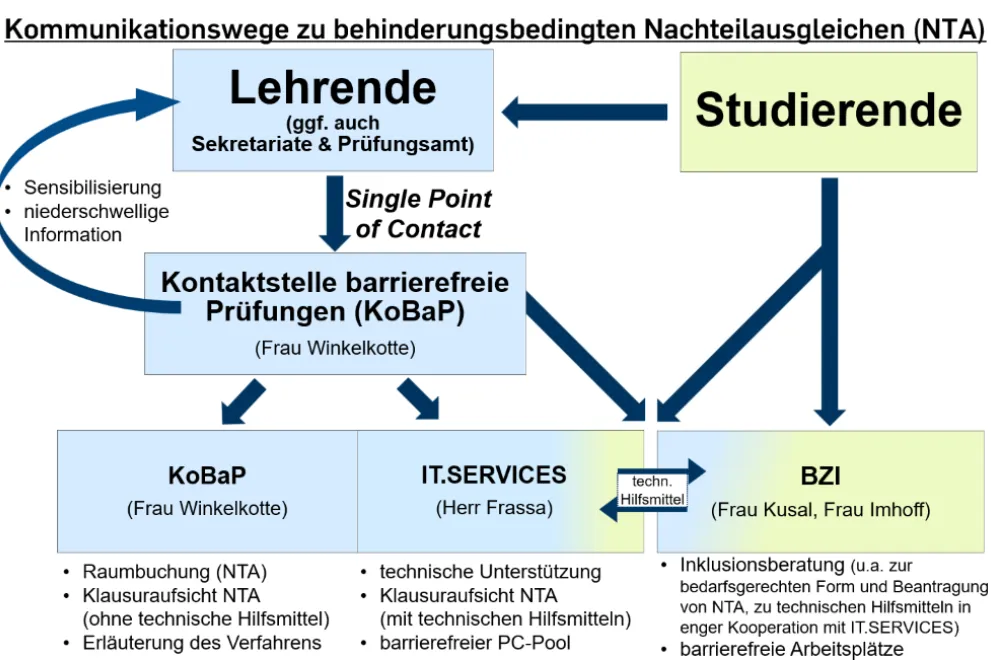Advice, compensation for disadvantages & services
Nachteilsausgleich in Prüfungen und Studium
Due to the effects of a disability or chronic illness, the design of teaching and examinations can stand in the way of those affected being able to show their own potential. To counteract this and ensure equal treatment, the "Landeshochschulgesetz" (Higher Education Act) provides for compensation for disadvantages.
On the basis of an application, compensation for disadvantages is always an individual case-by-case decision in which it is necessary to examine which measures can compensate for the specific disadvantages as fully as possible.
Applying for compensation for disadvantages
The decision to apply for a compensation for disadvantages is made - at the student's request - by the responsible "Prüfungsausschussvorsitz" (examination board chair). This is done using an established, transparent process including an application form (available in German only). The actual implementation of the compensation for disadvantages is generally the responsibility of the lecturer (see illustration: sample process).

Sample process description: Applying for compensation for disadvantages
We recommend that all students seek advice from the RUB representative for the interests and needs of students with disabilities or chronic illnesses in accordance with § 62b of the Higher Education Act at the BZI before submitting their (first) application. (www.akafoe.de/inklusion Make an appointment by e-mail to: bzi@akafoe.de or by telephone on 0234/32-11530) As a rule, you will receive an appointment for advice within approx. two weeks.
If you need advice on technical aids, IT.Services will support you (Tel.: 0234 32 28882, sebastian.frassa@ruhr-uni-bochum.de).
Compensation for disadvantages is only granted upon written application by the student.
Students can use the sample application form. In addition, a medical certificate or other suitable document must be obtained, which can be time-consuming. An application must be submitted in good time before an examination or coursework. The completed application must be sent to the chairperson of the relevant examination board/joint examination board. We recommend that students communicate their requirements (e.g. technical aids) in good time at the beginning of the course/semester!
A decision and notification by the examination board is usually made within a period of two weeks.
Students should discuss (approved) measures with the examiner in good time so that they can be implemented by the examination date.
Students are not responsible for the organization (room booking etc.) of the compensation for disadvantages!
Lecturers/faculties who need support with coordination can contact the Kontaktstelle barrierefreie Prüfung (KoBaP).
In the event that the evidence provided and the student's request appear incongruent, the chair of the examination board is required to consult the representative for the interests of students with disabilities and/or chronic illnesses before making a decision in order to avoid unjustified preferential treatment and to ensure non-discriminatory handling.
Advice and support for students
Students should contact the RUB representative for the concerns and needs of students with disabilities or chronic illnesses in accordance with § 62b of the Higher Education Act at the BZI's Inclusion Advisory Service for advice before applying for compensation for disadvantages.
In connection with technical aids, advice from IT.SERVICES (teaching and learning support) is also helpful.
For the specific application for compensation for disadvantages, we strongly recommend using the form "Application for compensation for disadvantages due to disability, chronic or mental illness" (available in German only). A "Medical certificate" template (available in German only) is also available for the submission of suitable evidence, which is also recommended.
Information and support for teachers
For information and support on the topic of compensation for disadvantages and its implementation, please contact the Contact Point for Accessible Examinations (KoBaP), which acts as a "single point of contact" and serves as an interface to other actors and services.
Communication channels to compensate for disadvantages for students and teachers

Students can contact the RUB representative according to HG, § 62b (Ms. Kusal) at the BZI for advice. There, Ms. Kusal provides advice on studying with a disability, including on the appropriate form and application for compensation for disadvantages and on technical aids in close cooperation with IT.SERVICES. There are also accessible workstations for students at the BZI.
Students must register their compensation for disadvantages with the lecturers or, if applicable, the secretariats for the respective examination. Lecturers, secretariats or examination offices can obtain support with the implementation from the Contact Point for Accessible Examinations. The contact point is the single point of contact for lecturers regarding the implementation of compensation for disadvantages. It supports lecturers in booking rooms for compensation for disadvantages, conducts exam supervision without technical aids or explains the procedure. If necessary, the contact point also refers lecturers to the RUB Representative according to §62 in the BZI or to IT.SERVICES.
IT.SERVICES provides support with the implementation and technical compensation for disadvantages, carries out exam supervision and manages the accessible PC pool.
Compensation for disadvantages is always an individual case-by-case decision in which it is necessary to check which measures can compensate for the specific disadvantages as fully as possible.
The Information and Advice Centre for Studies and Disability (IBS) at the "Deutsches Studierendenwerk (DSW)" provides an overview of exemplary(!) compensation for disadvantages in the organization of studies as well as in examinations and performance records on its homepage.
